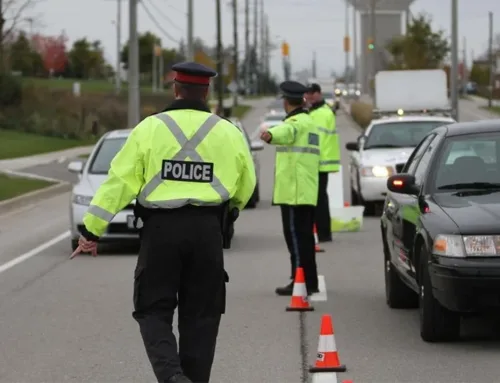For Ontario drivers, a speeding ticket can have lingering effects, from elevated insurance premiums to demerit points that may affect job opportunities. Understanding how long a speeding ticket stays on your record is essential to managing these consequences effectively. This comprehensive guide details the ins and outs of speeding tickets on your record in Ontario, including their impact, duration, and options for challenging them.
Overview of Speeding Violations in Ontario
Ontario takes speeding violations seriously, as it is a leading cause of accidents and road safety risks. Speeding offenses fall into various categories, each carrying unique penalties, demerit points, and implications for your driving record.
What Qualifies as a Speeding Violation?
A speeding violation occurs when a driver exceeds posted speed limits. In Ontario, the Highway Traffic Act establishes the fines and penalties for different tiers:
- 1-19 km/h over the limit: This is considered a minor offense, but still carries fines and demerit points.
- 20-29 km/h over: Moderate speeding incurs a higher fine and more demerit points.
- 30-49 km/h over: Serious speeding with steeper fines, multiple demerit points, and a greater impact on insurance.
- 50 km/h or more over the limit: This level of speeding qualifies as stunt driving or street racing, which can be considered a major offense in Ontario. Drivers caught at this level may face immediate roadside penalties, including license suspension and vehicle impoundment.
Each category of violation impacts your driving record in Ontario differently. However, any ticket will remain on your insurance record for three years.
Camera Speeding Tickets vs. Officer-Issued Speeding Tickets
In Ontario, camera speeding tickets differ significantly from tickets issued by police officers. Automated speed cameras capture license plate data and issue fines without identifying the driver, meaning that these tickets do not appear on a driver’s personal driving record and do not carry demerit points. This distinction makes camera-issued tickets less impactful for personal drivers, as they won’t affect insurance rates or result in record blemishes.
However, for commercial drivers, the situation is different. Camera speeding tickets are recorded on the Commercial Vehicle Operator’s Registration (CVOR) profile and accumulate CVOR points. Commercial drivers and companies should remain vigilant, as CVOR points contribute to a carrier’s safety rating and can lead to penalties, affecting the operation of commercial fleets. Therefore, while camera tickets are less concerning for personal drivers, they hold serious implications for those in the commercial driving sector.
How Long Does a Speeding Ticket Stay on Your Record in Ontario?
In Ontario, a standard speeding ticket stays on your record for three years from the date of conviction. This period allows insurance companies to view the violation when calculating your premiums, affecting your overall driving profile. Several factors can influence how long a ticket stays on your record, including:
- Severity of the Offense: Minor violations will remain on your record for three years.
- Impact on Insurance: Insurance providers in Ontario generally factor in speeding tickets for three years when calculating rates. The ticket’s presence on your record can lead to higher premiums during this period.
- Demerit Points: Demerit points associated with a speeding ticket last for two years, while the actual ticket stays on your record for three years.
If a driver accumulates multiple infractions within a short period, insurance companies may penalize them further, viewing them as high-risk clients. Therefore, even a minor speeding ticket can create lasting implications that may affect your driving record and finances for years.
Impact of Speeding Violations on Your Driving Record
Speeding violations have far-reaching consequences that can impact more than just your wallet. When a ticket appears on your driving record, it can lead to a host of effects, from higher insurance rates to the potential for future licence suspensions.
How Speeding Tickets Affect Insurance Rates
One of the most immediate and significant impacts of a speeding violation is on your insurance premiums. In Ontario, insurers use your driving record as a primary indicator of risk. A ticket suggests risky driving behavior, which insurance companies factor into premium calculations. Here’s how speeding tickets influence insurance rates:
- Premium Increases: A single minor violation can increase insurance premiums by 10% to 20 % or more. For more severe speeding tickets, such as those issued for driving 30 km/h or more above the limit, the increase could be far steeper.
- Potential Cancellation or Non-Renewal: Drivers with multiple convictions or serious violations may face policy cancellation or non-renewal. In this case, finding new coverage with another insurance provider may be more challenging and expensive.
- Long-Term Financial Impact: Even after the speeding ticket is removed from your record, its impact on insurance premiums may linger. Some insurers may consider previous violations, even if they don’t appear on your active driving record, when calculating long-term risk.
Each insurance company has a slightly different policy regarding the impact of convictions, but drivers should expect increased premiums for three years following the conviction.
Penalties and Fines for Speeding in Ontario
Ontario enforces strict fines and penalties for speeding, designed to deter drivers from exceeding speed limits. Fines are calculated based on the extent of the speeding violation, and more severe offenses can result in steep financial and legal consequences.
What Are the Most Expensive Speeding Tickets in Ontario?
The most expensive speeding tickets in Ontario are associated with extreme speeding and stunt driving. Here’s an overview of how fines and penalties escalate:
- Basic Speeding Fines: Speeding fines start at around $2 per kilometer over the speed limit for minor infractions. For instance, going 15 km/h over may result in a $30 fine, while 25 km/h over could mean a $75 fine. The fines increase at higher speeds.
- Severe Speeding Penalties: If a driver exceeds the speed limit by 30-49 km/h, fines escalate, and they can incur higher demerit points (usually 4). This level of speeding can lead to hundreds of dollars in fines and additional penalties.
- Stunt Driving or Racing: Speeds exceeding 50 km/h above the limit are categorized under stunt driving or racing. Fines can range from $2,000 to $10,000, depending on the severity. Additionally, offenders may face license suspension, vehicle impoundment, and potential jail time.
In some cases, Ontario courts may issue court fees and additional costs, especially if a driver is caught in a Community Safety Zone or an Active Construction Zone. The financial burden of these penalties can be significant, making it essential to explore your legal options.
Legal Options for Speeding Tickets
For drivers facing a speeding ticket, Ontario offers several legal avenues to reduce or potentially dismiss the charges. Traffic Paralegal Services specializes in helping clients navigate these options, ensuring that individuals can minimize the ticket’s impact on their records and finances.
How to Challenge a Speeding Ticket
Challenging a speeding ticket may be beneficial if you believe the charge was unfair, or you aim to reduce the penalties. Here are steps to consider when disputing a ticket:
- Consult a Traffic Paralegal: Consulting a legal professional from Traffic Paralegal Services can provide a strategic advantage. Paralegals experienced in Ontario traffic law understand the nuances of speeding charges and can recommend the best approach.
- Request Disclosure: You’re entitled to see the evidence against you, such as radar records and witness statements. This information may reveal errors in the speed measurement or police procedures, which could serve as grounds for dismissal.
- Plea Bargaining: In some cases, it’s possible to negotiate a reduced charge. Plea bargaining can lower the ticket from a severe speeding charge to a minor infraction, minimizing both fines and demerit points.
What to Do When Facing a Speeding Violation
If you receive a speeding ticket, it’s crucial to assess your options quickly. Taking the following steps can increase your chances of a favorable outcome:
- Review the Ticket Details: Examine your ticket for any errors, such as inaccurate details about your vehicle or location. Errors could potentially lead to dismissal.
- Evaluate the Financial and Legal Impact: Consider the cost of the fine, potential insurance increases, and how the ticket could affect your record.
- Engage with Traffic Paralegal Services: A professional traffic paralegal can guide you through the legal process, helping you decide whether to fight the ticket in court or accept a reduced charge through negotiation.
Conclusion
A speeding ticket in Ontario can stay on your record for three years, impacting your insurance rates, demerit points, and driving profile during that time. Understanding the nuances of how a speeding ticket affects your record can empower you to make informed choices, whether that means accepting the charge or challenging it with the assistance of a qualified paralegal.
Final Advice for Handling Speeding Violations in Ontario
When dealing with a speeding ticket, it’s essential to weigh your options carefully. While paying the fine may seem convenient, consulting with Traffic Paralegal Services could open up options for reduced charges or dismissed penalties. A proactive approach, particularly with professional guidance, can help you mitigate the impact of speeding violations on your driving record and insurance premiums.










Leave A Comment
You must be logged in to post a comment.